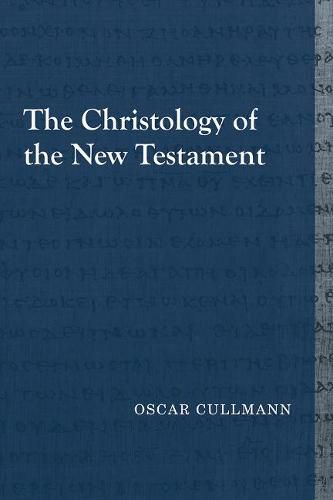Readings Newsletter
Become a Readings Member to make your shopping experience even easier.
Sign in or sign up for free!
You’re not far away from qualifying for FREE standard shipping within Australia
You’ve qualified for FREE standard shipping within Australia
The cart is loading…






This title is printed to order. This book may have been self-published. If so, we cannot guarantee the quality of the content. In the main most books will have gone through the editing process however some may not. We therefore suggest that you be aware of this before ordering this book. If in doubt check either the author or publisher’s details as we are unable to accept any returns unless they are faulty. Please contact us if you have any questions.
Oscar Cullmann’s The Christology of the New Testament was the standard student textbook in New Testament courses and the measuring stick for scholarly inquiry into Christology for decades. An enduring classic, this book is based on a lifetime of study from one of the most creative and disciplined minds ever to tackle the problem of New Testament Christology. Cullmann moves methodically through his careful philological and textual consideration of the various titles used for Jesus in the New Testament, dividing them into four groups: titles used to refer to Jesus’ earthly life (prophet, servant, and priest); titles used to refer to Jesus’ eschatological work (Messiah and Son of Man); titles used to refer to Jesus’ present work in the church (Lord and Savior); and titles used to refer to Jesus’ preexistence (Word and Son of God). In each case, he weighs the New Testament’s usage of each title against the Old Testament, Second Temple Jewish, and Hellenistic semantic backgrounds. Though Cullmann sifts the evidence analytically and presents it systematically, the end result is not simply a christological lexicon. Instead, he creates a cohesive picture by showing that early Christianity’s view of Jesus originated with the historical Jesus himself. For Cullmann, New Testament Christology was not a later Hellenistic imposition upon earlier Jewish beliefs about Jesus. Rather, the titles used for Jesus form a chain of specific events centered around Jesus, events that fit into and extend the long string of God’s saving deeds in history. Cullmann’s Christology remains as instructive and important today as when it first appearedaand still repays careful reading and study.
$9.00 standard shipping within Australia
FREE standard shipping within Australia for orders over $100.00
Express & International shipping calculated at checkout
This title is printed to order. This book may have been self-published. If so, we cannot guarantee the quality of the content. In the main most books will have gone through the editing process however some may not. We therefore suggest that you be aware of this before ordering this book. If in doubt check either the author or publisher’s details as we are unable to accept any returns unless they are faulty. Please contact us if you have any questions.
Oscar Cullmann’s The Christology of the New Testament was the standard student textbook in New Testament courses and the measuring stick for scholarly inquiry into Christology for decades. An enduring classic, this book is based on a lifetime of study from one of the most creative and disciplined minds ever to tackle the problem of New Testament Christology. Cullmann moves methodically through his careful philological and textual consideration of the various titles used for Jesus in the New Testament, dividing them into four groups: titles used to refer to Jesus’ earthly life (prophet, servant, and priest); titles used to refer to Jesus’ eschatological work (Messiah and Son of Man); titles used to refer to Jesus’ present work in the church (Lord and Savior); and titles used to refer to Jesus’ preexistence (Word and Son of God). In each case, he weighs the New Testament’s usage of each title against the Old Testament, Second Temple Jewish, and Hellenistic semantic backgrounds. Though Cullmann sifts the evidence analytically and presents it systematically, the end result is not simply a christological lexicon. Instead, he creates a cohesive picture by showing that early Christianity’s view of Jesus originated with the historical Jesus himself. For Cullmann, New Testament Christology was not a later Hellenistic imposition upon earlier Jewish beliefs about Jesus. Rather, the titles used for Jesus form a chain of specific events centered around Jesus, events that fit into and extend the long string of God’s saving deeds in history. Cullmann’s Christology remains as instructive and important today as when it first appearedaand still repays careful reading and study.